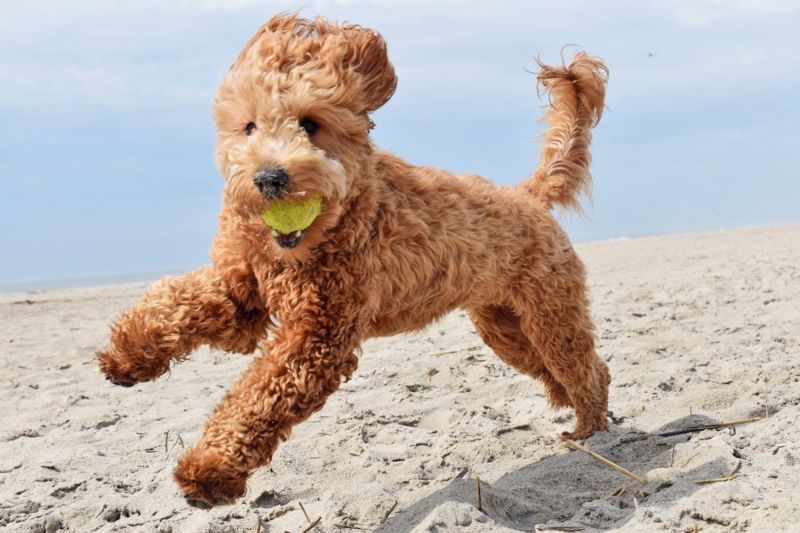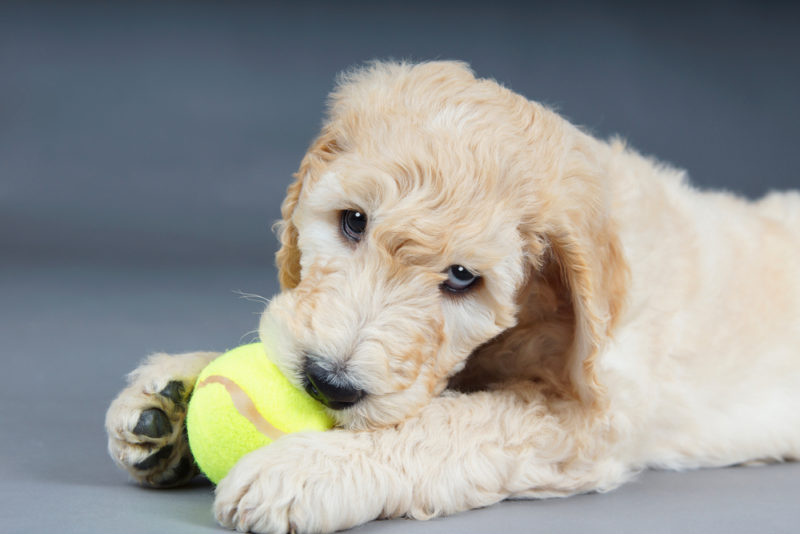Goldendoodles are one of the dog breeds with the most excess energy. With intelligent, active golden retriever and poodle parents (and all that hybrid vigor), it’s easy to see why. If you’re worried that your doodle’s high-energy behavior is on the verge of becoming undesirable behavior, it’s time to take action ASAP.
As smart, active dogs, goldendoodles require lots of exercise, mental stimulation and positive reinforcement. What’s more, most problem behaviors are learned behaviors, and proper training is the best way to avoid them altogether.
Continue reading to learn more about how to identify and calm down a hyper goldendoodle.

Signs Your Doodle Has Pent-Up Energy
When it comes to goldendoodles, expect high energy levels. Most people opt for a doodle because they know they’re loving, joyful and excitable companions. They love nothing more than snuggling up with you after a long day and will always be over the moon to see you.
Manic behavior is likely if your dog doesn’t get enough physical activity throughout the day. However, doodles are naturally energetic dogs with boundless enthusiasm and zest for life. If you’re confused about whether your pet is displaying normal behavior or hyperactivity, here are some signs it might have excess energy compared to other dogs:
- Problem barking: Excess barking is a common sign of under-stimulation. Your pet might whine and bark as a way of letting you know it needs attention and exercise. Keep in mind this isn’t naughty behavior — it’s communicating its needs to you. If it doesn’t need water, food or potty, there’s a good chance it needs playtime.
- Pulling on its leash: Pulling on the leash is a sign your dog has too much pent-up energy and can’t control itself. Provided you’ve trained your doodle, it should know that pulling on the leash isn’t desirable, and you might have a problem if it’s constantly doing so.
- Destructive behavior: Chewing on things it shouldn’t and destroying furniture or toys is a sign of excess energy. Add more exercise and playtime to its routine to prevent this from happening.
- Physically tiring quickly: If your doodle seems to cycle through zoomies and passing out, it’s a sign that it’s not getting enough exercise. These sudden bursts of energy occur spontaneously when your pet hasn’t done enough throughout the day or week to release it.
Why Do Goldendoodle Puppies Have So Much Energy?
As you can tell, the main reason for a hyper doodle is a mixture of natural temperament and lack of exercise. That said, all goldendoodle owners should expect the first three years to be jam-packed with playtime and high-energy behavior. Even after your doodle loses its puppy teeth at around six to eight months old, puppy-like behavior is likely to continue.
Generally speaking, doodles are most hyper during the early stage of life, then become a little more docile at three years old and calm down a lot by the time they reach 10.
Want a Calm Dog? Check Yourself First
Before getting into specific tips about how to maintain a steady energy level for goldendoodles, it’s important you understand the importance of your behavior. It’s not only an active lifestyle that you need to maintain as a dog parent; you should also work hard to maintain a calm mind.
When a dog lives in your home, it’s entirely at the mercy of your routine, moods and actions. Dogs are very sensitive animals and naturally match your energy levels to please you and fit into your environment. Stress, anxiety and anger are very distressing for dogs and might cause them to act out. Regularly getting into a frenzy of love and fuss can also be detrimental.
If you get super-excited every time you come home and see your pet, you teach it that overexcitement is acceptable. Likewise, if you speak loudly and get very animated, you teach it that this behavior is normal. On the other hand, if you’re calm and consistent, you set the right example for them. Provided it’s sufficiently trained and gets enough exercise, your dog will most likely match your energy levels.
Calming High-Energy Dogs During the Puppy Stage
Are goldendoodles good dogs? The answer is a resounding yes! However, proper training and a health-promoting daily routine are essential for bringing out the best in your pet. Below are the key components for evening out the energy levels of a hyper doodle.
Early Training Methods Prevent Too Much Energy in a Goldendoodle Puppy
Issues such as play biting, excessive licking, chewing, mouthing, tugging and wrestling are common among goldendoodle puppies. They’re not signs of behavioral problems; they’re a natural part of a puppy’s development. However, it’s essential that you work hard to train your puppy to meet your expectations.
Investing in a puppy that’s already had basic training from a professional is one of the best ways to avoid problems down the line.
Regular Exercise
For a goldendoodle, exercise is paramount. What constitutes enough exercise? For most doodles, daily exercise split into two walks around your local area or a dog park is ideal. Dog parks are great because they provide opportunities for socialization and training, which can help your dog learn how to maintain a calm demeanor.
The amount of exercise varies depending on the goldendoodle’s stage of development:
- Up to three months: 15 minutes, twice per day
- Up to five months: 20 minutes, twice per day
- Up to six months: 25 minutes, twice per day
- Eight months and upwards: 30 minutes, twice per day
The easiest way to deal with a hyperactive doodle is as simple as giving it more exercise. Keep in mind that the above timeframes are for outdoor walks — time in the backyard or indoors playing should be separate. Getting the right amount of exercise for its needs doesn’t just promote good behavior; it helps ensure your pet lives a longer, healthier life.
Scent Training
Scent training is one of the most effective ways to occupy a goldendoodle and keep it happy. Playing fetch offers physical stimulation, and providing toys offers mental stimulation, but nose work combines both. Here’s how to play:
- Start off by hiding treats (boiled chicken, dried liver snacks or grated cheese) in empty cardboard boxes.
- Reward your dog every time it finds a hidden treat.
- Increase the difficulty of the hiding places gradually over time.
Sniffing is physically and mentally tiring for your goldendoodle, so if it’s bursting with energy, this is a great way to center it and calm it down.
Interactive Toys
Toys shouldn’t be a luxury for your dog; they’re necessary to keep puppies and adult goldendoodles happy and entertained. They help your dog relax, unwind and de-stress. Some ideas for toys include:
- Squeaky toys
- Chew toys
- Brain games
- Balls
- Ropes
- Plushies
- Bones
- Hidden treat toys
Work With a Professional Dog Trainer
If you’re having trouble with your puppy’s behavior, don’t hesitate to reach out to a professional dog trainer. They can help you refine your doodle’s behavior and teach you tips and tricks to prevent hyperactivity.

Keeping Goldendoodles Calm During the Adult Phase
Generally speaking, older dogs should be calmer than their younger counterparts. Goldendoodle puppies are notoriously active, and high energy is to be expected no matter how much you train and exercise your pet. However, if the following issues keep coming up, consider changing your pet’s routine or working with a professional to get to the root of the problem:
- Stop excessive barking: If issues such as problem chewing and excessive barking aren’t nipped in the bud during puppyhood, these bad habits can persist.
- Prevent biting: Puppies mouth and bite as a matter of course, but this shouldn’t persist beyond around 12 months of age.
What Can I Do If My Goldendoodle’s Hyper?
To sum up, here’s a breakdown of the most important steps for goldendoodle owners to take when dealing with a hyperactive goldendoodle:
- Set the example by being calm and consistent with your manner towards your pet.
- Don’t reward hyperactive behavior, no matter how cute it is.
- Never shout at or punish a dog for being hyper; negative reinforcement often leads to more problem behaviors.
- Give your pet enough walks, exercise and toys, and dedicate time to play games with it each day.
- Work with a dog trainer or hire a dog walker to get the best out of your doodle.
Remember, the above doesn’t constitute pet medical advice. Seek advice from a licensed veterinarian immediately if your dog’s behavior is dangerous.
Will My Goldendoodle Ever Calm Down?
Like golden retrievers, most goldendoodles calm down significantly once they reach adulthood, then become increasingly docile as they age. The best way to ensure your goldendoodle is calm and happy is by getting training right when it’s a puppy. Check out the doodle puppies with training at Pride and Prejudoodles today.
